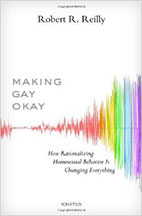
FGF E-Package
From Under The Rubble
May 22, 2014
Perversion’s Progress
by Christopher Manion
fitzgerald griffin foundation

“La bandera del orgullo LGTB ondea hoy en la embajada por el Día Internacional contra la Homofobia y la Transfobia.”
– El Mundo, Madrid
[Translation: “The flag of LGBT Pride waves today above the U.S. Embassy in Madrid in honor of the
International Day Against Homophobia and Transphobia.”]FRONT ROYAL, VA — Robert Reilly spent years plowing through thousands of pages of turgid narcissism so that you don’t have to. The result is a truly important book that lays out the template and the timeline for the triumph of sodomy in America: Making Gay Okay: How Rationalizing Homosexual Behavior is Changing Everything (Ignatius Press, 250 pages, 2014).
[Making Gay Okay] is a truly important book that lays out the template and the timeline for the triumph of sodomy in America.
Reilly argues that recognizing sodomy’s senselessness requires not a religious conversion but only intellectual honesty.
The book offers a steady stream of common sense, beginning with a consideration of nature, truth, and reality, goods universally acclaimed by Western Civilization for millennia until the rise of the modern Prometheans (Reilly focuses on Rousseau).
With that background, Reilly chronicles the evisceration of nature, truth, and beauty in several contemporary cultural arenas, quietly suggesting that there are more to come.
The study suggests some urgency: Sodomy might sell, but it also kills — its practitioners can count on subtracting twenty years or so from their life expectancy. But that fact seems only to inspire them.
Moreover, sodomy’s practitioners are not its only victims. Reilly details the ongoing sanctification of the “unnatural act” in one American institution after another, to the profound detriment of all of them.
Oh, did I say “sodomy”? Yes, and so does Reilly. All the time.
Reilly believes in calling things by their proper names. After all, it is the act of sodomy which distinguishes sodomites from everyone else.
After all, apart from sodomy, they really are equal.
But these folks don’t want to be “equal” apart from sodomy; they want to be “equal” because of it. And this book explains why.
In their intrepid campaign, strategic vocabulary is indeed vital. In itself, this is nothing new. After all, Stalin wrote a book on the importance of language.
But that was nothing new either. In his Analects, Confucius insists that the first order of business in resuscitating a collapsed society must be the restoration of the proper meaning of words.
And ideology’s first order of business is to hijack them.
In its deliberate and methodical flight from reality, postmodernism flees concrete realities to embrace, and then purloin, abstractions.
To be useful, such concepts must first be emptied of their proper meaning — witness, for instance, “gay,” “rights,” “equality,” and “natural.” Only with their perverted content can they be employed to justify irrationality.
For millennia, the West has considered sodomy to be one of the “four sins that cry out to heaven for justice.” That used to be a pretty big deal. But “sin” and “heaven” have fallen out of favor these days, and justice, as Thracymachus told Socrates, is merely the law of the stronger.
Reilly’s study makes no reference to religious doctrine. “I make no case for religion or revelation in this book,” he writes, “only from reason, as it discloses to us the Nature of things.”
He argues that recognizing sodomy’s senselessness requires not a religious conversion but only intellectual honesty.
Reilly begins with a welcome and cogent review of the history of Western Civilization’s intellectual patrimony. He compactly and lucidly traces the ingredients of a good society and places them in their modern context.
His conclusion: today, truth is an endangered species.
The Flip Side of RousseauTo the West’s civilized tradition Reilly opposes Jean-Jacques Rousseau, whom many would recognize as the godfather of the French Revolution and its totalitarian successors.
But Reilly plumbs the lesser-known Rousseau, especially his anthropology — which denies the intellect’s ability to know the truth at all. Instead, the intellects must serve the will’s perverted desire to satisfy the endless demands of warring passions and appetites.
In other words, Rousseau’s vision of man invites social chaos, and then tyranny.
Reilly dwells on psychology long enough to put on display the moral relativism involved, and its impact on the individual — including, of course, the sodomite.
The second half of the book then describes its impact on the institutions — science, the family, the schools, the Boy Scouts, the military, the courts, and even foreign policy.
Of course, that will not be enough. As with all irrational indulgences, it never ends. The originally private perversion becomes a social crusade by necessity.
Reilly offers a revealing but somewhat macabre account of how psychiatry “changed its mind” about sodomy.
“The homosexual cause moved naturally from a plea for tolerance to cultural conquest because the rationalization upon which it is based requires the assent of the community to the normative nature of the act of sodomy,” Reilly writes.
“In other words, we all must say that the bad is good in order for the rationalization to be secure in itself.”
“Everything is in flux,” said Heraclitus, some 2500 years ago, “but seek the logos.” Heraclitus did not know the name of the logos: that is revealed only in the Gospel of John: “In the beginning was the Word (logos), and the Word was with God, and the Word was God.” (John 1:1)
Well, Rousseau would have none of that, and neither do our postmodern Sodomy Crusaders. Today’s advocates of “gay rights” reject philosophy and all its works, and embrace instead revolution: with Prometheus, they “hate all the gods.” (Aeschylus, Prometheus Bound, 975)
Of course, nowadays that includes Christ, the logos Himself.
Aeschylus’ Hermes responds to Prometheus, “Your words declare you stricken with no slight madness.” And, happily, Reilly finds an echo of Aeschylus in Irenaeus 700 years later: “Thinking against nature, you will become foolish. And if you insist, you will fall into insanity.” (Against Heresies, 180 A.D.)
Speaking of insanity, consider the shrinks: one of Reilly’s choicest discoveries concerns the views of the “scientific community” regarding sodomy. “This is science as ideology,” he writes, citing a marvelous line from the New England Journal of Medicine of July 2003, regarding embryonic stem cell research: “The Promethean prospect of eternal regeneration awaits us.”
Insanity lives.
Painstaking Research and Surprising Finds
Reilly offers a revealing but somewhat macabre account of how psychiatry “changed its mind” about sodomy.
“Until 1973,” he writes, “homosexuality was defined as a mental illness in the Diagnostic and Statistical Manual of the American Psychiatric Association (APA).
But in the early 1970s, homosexual agitators began crashing medical meetings to demand that psychiatrists “remove the ‘sickness label’” that gay rights groups considered an “albatross.”
If that failed, the group threatened “to discredit psychiatry.”
Well, who better than a psychiatrist knows a Napoleon Complex when he sees one? And yet, instead of rejecting this crude canard conducted by sociopaths (as they labeled sodomites until 1968), the APA caved.
Why?
Well, in 1973, open homosexuals were not even allowed to practice psychiatry. But in that year a group of “newly energized [and closet] homosexual psychiatrists” met at a gay bar in Hawaii during the APA annual meeting there. In short order they engineered a reversal of the group’s official view — in response to strident “gay activism,” according to the account of one participant.
“It never was a medical decision,” writes Lesbian chronicler Barbara Gittings. “It was a political move.”
So much for the junk science routinely cited as gospel in the sodomite media.
“Gay activism” works, as Reilly demonstrates in the chapters that chronicle sodomy’s “March Through The Institutions.”
The prospective reader might assume that Reilly merely recounts what’s already appeared, ad nauseam, in blogs, magazines, and other media.
Quite the contrary: the true virtue of this study is its patient, consistent, and thorough treatment that probes far below the cacophony of the culture wars.
Indeed, this revealing work probes not only the fundamental errors of the Sodomy Sanctifiers, but also the magnitude of their lustful lunge for power.
Reilly depicts a sodomite movement so grim, vicious, and determined that it makes Saul Alinsky look like Mother Teresa.
All in a calm and compelling tone. The book seeks not to attack but to understand, and for that, it is essential reading.
From Under the Rubble archives
From Under the Rubble is copyright © 2014 by Christopher Manion. All rights reserved.
Christopher Manion is Director of the Campaign for Humanae Vitae™, a project of the Bellarmine Forum. He served as a staff director on the Senate Foreign Relations Committee for many years. He has taught in the departments of politics, religion, and international relations at Boston University, the Catholic University of America, and Christendom College. This column is sponsored by the Bellarmine Forum.
See a complete biographical sketch.
To subscribe or donate to the FGF E-Package online or send a check to:
713 Park St., SE
Vienna, VA 22180
© 2014 Fitzgerald Griffin Foundation
